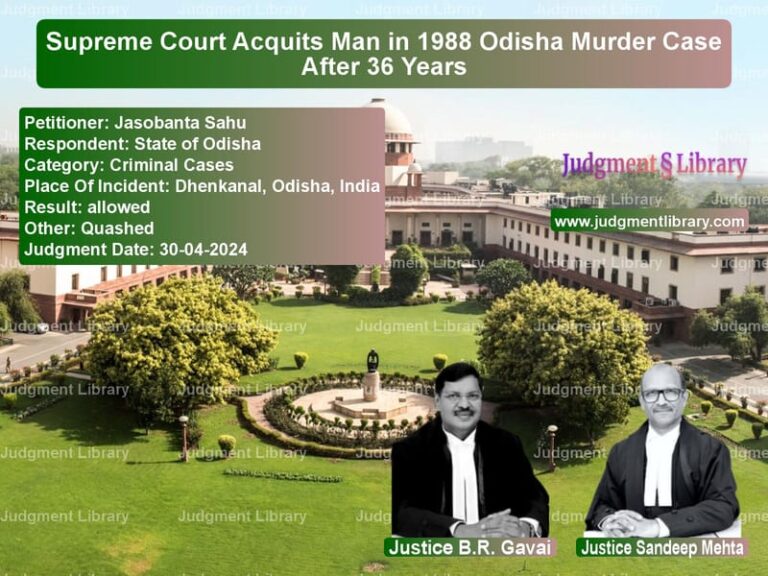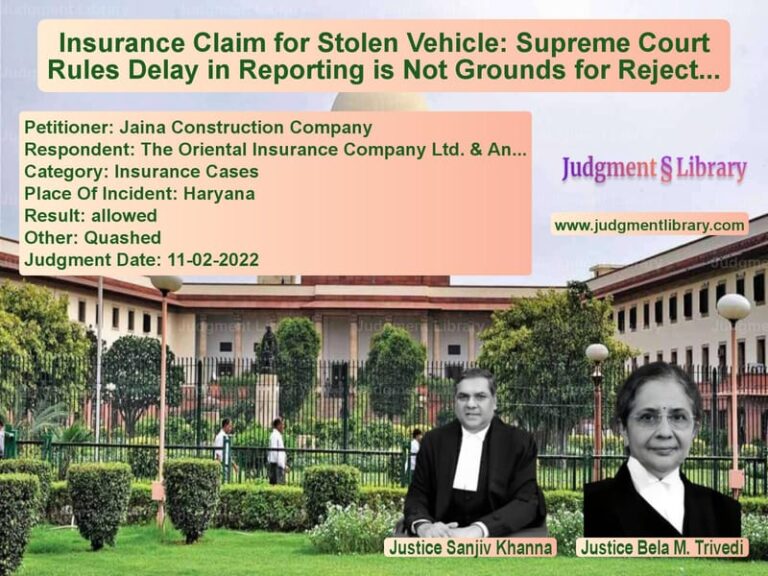Property Dispute Over Compensation: Supreme Court Upholds Execution of Eviction Order
The Supreme Court of India recently delivered a significant ruling in Kusum Harilal Soni v. Chandrika Nandlal Mehta & Anr., addressing a long-standing dispute involving property rights, eviction orders, and fraudulent attempts to obstruct the execution of a judicial decree. The case primarily revolved around an eviction order and compensation claim arising from a tenancy dispute in Mumbai.
Background of the Case
The dispute originated when Kusum Harilal Soni (the appellant) filed a suit for eviction against Chandrika Nandlal Mehta (respondent no. 1) concerning Flat No. F-201, Building No.4, Prem Nagar, Borivali (West), Mumbai. The lease license had expired on November 1, 1994, but the tenant continued occupying the property without paying the agreed compensation of Rs. 8,000 per month. Subsequently, an eviction order was passed by the competent authority, directing respondent no. 1 to vacate the premises and pay compensation.
After the High Court rejected the tenant’s appeal against eviction, respondent no. 2 (the tenant’s daughter) filed a Special Leave Petition (SLP) before the Supreme Court but later withdrew it after making a statement that possession had already been handed over. However, despite vacating the premises, the respondent failed to pay the outstanding compensation.
The appellant initiated execution proceedings under Order 21 Rules 41 and 42 of the Code of Civil Procedure (CPC) to recover the unpaid compensation, seeking attachment of another property owned by respondent no. 1, Flat No. 408, Saidham Co-operative Society, Borivali (West), Mumbai. The appellant alleged that the respondent fraudulently transferred this flat to her daughter through an unregistered agreement dated June 26, 2001, in an attempt to evade the payment.
Key Legal Issues Considered
- Whether the alleged transfer of the flat to the respondent’s daughter was a fraudulent transaction meant to obstruct the execution of a judicial decree.
- Whether the High Court erred in setting aside the attachment of the flat, allowing the respondents to escape liability.
- Whether an unregistered agreement between mother and daughter could be considered a legitimate transfer of ownership.
- Whether the appellant had the legal right to recover the unpaid compensation through property attachment.
Arguments by the Appellant (Kusum Harilal Soni)
The appellant, arguing for the enforcement of the eviction decree and compensation order, presented the following points:
- Respondent no. 1 transferred her flat to respondent no. 2 (her daughter) through an unregistered agreement dated June 26, 2001, after the eviction and compensation order had attained finality.
- The transaction was fraudulent and designed to defeat the judicial decree by preventing attachment of the property.
- The respondents had colluded to obstruct the execution proceedings and evade payment of Rs. 6,48,000 in compensation.
- The High Court had previously made an order for property attachment absolute, which should not have been reversed.
Arguments by the Respondents
Respondent no. 2 (the tenant’s daughter) opposed the attachment, arguing:
- She had legally acquired the flat from her mother through a Memorandum of Understanding (MOU) dated June 11, 1995, and an agreement dated June 26, 2001.
- The flat was not in her mother’s possession at the time of execution, and thus, it could not be attached.
- The High Court correctly ruled in her favor, setting aside the attachment and directing the appellant to initiate a separate suit for title determination.
Supreme Court’s Judgment
After reviewing the case, the Supreme Court ruled in favor of the appellant, overturning the High Court’s order and restoring the attachment of the flat. The Court’s key findings included:
- The alleged transfer was fraudulent and intended to defeat the execution of the compensation order.
- The MOU and sale agreement were unregistered, lacked credibility, and had not surfaced until the execution proceedings began.
- The timing of the transfer, immediately after eviction proceedings, raised strong suspicions of mala fide intent.
- The respondents failed to establish any legitimate title transfer.
- The attachment of the flat was valid under Order 21 Rule 42 CPC, allowing creditors to recover debts through the debtor’s assets.
The Court observed:
“The mother and daughter colluded to obstruct the execution of a binding judicial order through a sham transaction. The timing and nature of the alleged transfer expose its fraudulent character.”
The Court further ruled:
- The High Court erred in setting aside the attachment, as the execution proceedings were already at an advanced stage.
- The appellant was entitled to recover the unpaid compensation by attaching and selling the disputed flat.
- The respondents’ fraudulent attempt to evade payment would not be entertained by the Court.
Implications of the Judgment
The ruling sets an important precedent on the enforcement of judicial decrees and the prevention of fraudulent transactions aimed at obstructing execution proceedings. Key takeaways include:
- Court orders for eviction and compensation cannot be circumvented through fraudulent property transfers.
- Unregistered property transfer agreements lack legal standing in execution proceedings.
- Property attachment remains a valid mechanism for debt recovery when a debtor attempts to evade payment.
- The judiciary remains vigilant against collusive actions that seek to undermine the rule of law.
Conclusion
The Supreme Court’s ruling in this case reinforces the importance of judicial enforcement and the need to prevent fraudulent transfers aimed at frustrating execution proceedings. By upholding the appellant’s right to recover compensation through property attachment, the judgment ensures that debtors cannot escape their obligations by engaging in sham transactions. This decision will serve as a critical reference for similar cases involving property disputes, tenancy laws, and judicial decree enforcement.
Don’t miss out on the full details! Download the complete judgment in PDF format below and gain valuable insights instantly!
Download Judgment: Kusum Harilal Soni vs Chandrika Nandlal Me Supreme Court of India Judgment Dated 12-04-2016-1741854552116.pdf
Direct Downlaod Judgment: Direct downlaod this Judgment
See all petitions in Property Disputes
See all petitions in Debt Recovery
See all petitions in Damages and Compensation
See all petitions in Judgment by V. Gopala Gowda
See all petitions in Judgment by Arun Mishra
See all petitions in allowed
See all petitions in Modified
See all petitions in supreme court of India judgments April 2016
See all petitions in 2016 judgments
See all posts in Civil Cases Category
See all allowed petitions in Civil Cases Category
See all Dismissed petitions in Civil Cases Category
See all partially allowed petitions in Civil Cases Category







